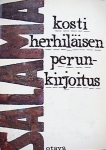(Family and kin) The use of double surname
| I didn't pay much attention to this article itself, only to the use of double surname by the interviewee, who works at a feminist journal. She is credited as Cho-Yi (조이) for her surname, which combines both her father's and mother's family names. Her legally registered name is the other of those two, the one that she got from her father, perhaps Cho. In Korean feminist circles it's nowadays quite common to use a double surname to emphasize that one is born of two parents. That is only a practice which does not (and most likely will not have for a long time) a legal basis, and these people will have their father's names, unless there's no legally recognized father. (Cannot remember now whether it has become allowed to give the stepfather's family name to the children in case the mother remarries; at least there has been that kind of legislation in progress.) One of the first proponents of this practice is the anthro professor in Yonsei, Cho(-Han) Haejoang, who's been referred to as "Margaret Mead of Korea", for her feminist and social activities. I remember my grad student mates telling about his son also using a double surname. What should be remembered is that the "mother's surname" these people add to their legally recognized name is actually their mother's father's surname, which is as patrilineal (I love this anthro lingo) as their father's name. "Matrilineality" cannot be but one generation deep in Korea. (Getting married, I could have chosen to become Antti Joung; now that would have been funny to explain to Koreans...) Categories at del.icio.us/hunjang: women-men ∙ Koreanculture |

